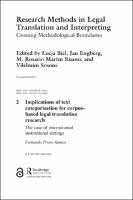Chapter 2 Implications of text categorisation for corpusbased legal translation research
Proposal review
The case of international institutional settings
| dc.contributor.author | Ramos, Fernando Prieto | |
| dc.date.accessioned | 2019-10-17 13:47:28 | |
| dc.date.accessioned | 2020-04-01T10:12:43Z | |
| dc.date.available | 2020-04-01T10:12:43Z | |
| dc.date.issued | 2019 | |
| dc.identifier | 1005217 | |
| dc.identifier | OCN: 1135847107 | en_US |
| dc.identifier.uri | http://library.oapen.org/handle/20.500.12657/24887 | |
| dc.description.abstract | This chapter highlights the relevance of text categorisation for research in legal translation by focusing on institutional translation settings, namely: the European Union (EU), the United Nations (UN) and the World Trade Organization (WTO), and their corresponding adjudicative bodies.1 After briefly reviewing recurrent issues and models of legal text classification (section 2), a multidimensional approach is applied to the multilingual text production of the three representative institutional translation settings during three years over the span of a decade (2005, 2010 and 2015), as part of the project “Legal Translation in International Institutional Settings: Scope, Strategies and Quality Markers” (LETRINT) (section 3). The resulting subdivisions are integrated into a categorisation matrix and discussed as a way of illustrating the relative nature and implications of text classifications. The fine-grained description of corpus design and representativeness, technical aspects of corpus compilation and full taxonomies of genres are not addressed in this chapter. | |
| dc.language | English | |
| dc.subject.classification | thema EDItEUR::C Language and Linguistics | en_US |
| dc.subject.classification | thema EDItEUR::L Law | en_US |
| dc.subject.other | legal translation | |
| dc.subject.other | institutional translation settings | |
| dc.subject.other | EU | |
| dc.subject.other | UN | |
| dc.subject.other | WTO | |
| dc.title | Chapter 2 Implications of text categorisation for corpusbased legal translation research | |
| dc.title.alternative | The case of international institutional settings | |
| dc.type | chapter | |
| oapen.relation.isPublishedBy | 7b3c7b10-5b1e-40b3-860e-c6dd5197f0bb | |
| oapen.relation.isPartOfBook | d5baae41-ade0-42a4-afc2-a9b979ef7fdf | |
| oapen.relation.isbn | 9781351031226 | |
| oapen.imprint | Routledge | |
| oapen.pages | 20 | |
| oapen.remark.public | 3-8-2020 - No DOI registered in CrossRef for ISBN 9781138492103 | |
| oapen.identifier.ocn | 1135847107 | |
| peerreview.anonymity | Single-anonymised | |
| peerreview.id | bc80075c-96cc-4740-a9f3-a234bc2598f1 | |
| peerreview.open.review | No | |
| peerreview.publish.responsibility | Publisher | |
| peerreview.review.stage | Pre-publication | |
| peerreview.review.type | Proposal | |
| peerreview.reviewer.type | Internal editor | |
| peerreview.reviewer.type | External peer reviewer | |
| peerreview.title | Proposal review | |
| oapen.review.comments | Taylor & Francis open access titles are reviewed as a minimum at proposal stage by at least two external peer reviewers and an internal editor (additional reviews may be sought and additional content reviewed as required). | |
| oapen.review.comments | Taylor & Francis open access titles are reviewed as a minimum at proposal stage by at least two external peer reviewers and an internal editor (additional reviews may be sought and additional content reviewed as required). |

